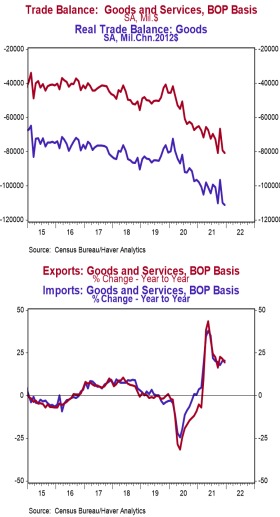- The trade deficit in goods and services grew to $80.7 billion in December, smaller than the consensus expected $83.0.
- Exports rose by $3.4 billion, led by nonmonetary gold, pharmaceuticals, and autos. Imports rose $4.8 billion, led by cellphones & other household goods, toys, games, & sporting goods, and autos.
- In the last year, exports are up 19.5% while imports are up 20.3%.
- Compared to a year ago, the monthly trade deficit is $14.9 billion larger; after adjusting for inflation, the “real” trade deficit in goods is $14.6 billion larger than a year ago. The “real” change is the trade indicator most important for measuring real GDP.
Implications:
The trade deficit grew to $80.7 billion in December, as imports grew faster than exports. We like to follow the total volume of trade (imports plus exports), which signals how much businesses and consumers interact across the US border. That measure rose 1.6% in December, is up 20.0% versus a year ago, and sits at record highs. In general, the increase in the total volume of trade signals a recovery from COVID-19. For the entire year 2021, the trade deficit grew by 27.0% to the largest on record. Expect the trade deficit to remain volatile from month to month but generally remain large in the months ahead as the US has recovered from the coronavirus faster than most other countries. This means the demand for imports should continue to outstrip the demand for exports to the rest of the world. Also, the US is still running low on inventories for many goods due to the surge in consumer spending, which has been artificially boosted by large government checks to consumers. That means the appetite for imports will remain much stronger than normal as companies try to restock their shelves and warehouses. Supplychain issues haven’t improved as ports remain overwhelmed in the US. For example, the port of Los Angeles currently has 43 container vessels waiting to be unloaded with the average anchorage time right now at 18.8 days. Omicron cases in the United States are starting to dissipate, and states this time around for the most part did not overreact with draconian restrictions like they did in 2020, so look for overall trade to keep expanding in the coming months as businesses across the US get back on their feet. It also looks like confidence is picking up with visitors from abroad as travel exports (spending by visitors to the US) grew for the 4th consecutive month reaching a pandemic-high of $8.6 billion.





